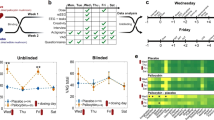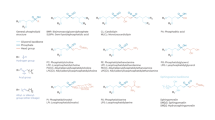Abstract
OBJECTIVE: This study examined the effects of covert alterations in the energy density (ED) of mixed, medium fat (MF) diets on ad libitum food and energy intake (EI), subjective hunger and body weight in humans.
DESIGN: Randomised cross-over design. Subjects were each studied three times (factorial design), during 14 d, throughout which they had ad libitum access to one of three covertly-manipulated MF diets.
SUBJECTS: Six healthy men, mean age (s.e.m.)=30.0 y (12.76 y), mean weight=71.67 kg (19.80 kg); mean height=1.79 m (0.22 m), body mass index (BMI)=22.36 (2.60) kg/m2, were studied. The fat, carbohydrate (CHO) and protein in each diet (as a proportion of the total energy) and energy density (ED) were, low-ED (LED), 38:49:13%; 373 kJ/100 g; medium-ED (MED), 40:47:13%; 549 kJ/100 g; high-ED (HED), 39:48:13%; 737 kJ/100 g. Subjects could alter the amount but not the composition of foods eaten. They were resident in (but not confined to) a metabolic suite throughout the study.
RESULTS: Solid food intake decreased as ED increased, giving mean values of 2.84, 2.51 and 2.31 kg/d, respectively. This was insufficient to defend energy balance, since energy intake increased with increasing ED (F (2,10) 16.08; P<0.001) giving mean intakes of 10.12, 12.80 and 16.17 MJ/d, respectively. Rated pleasantness of food (measured on visual analogue scales) was not significantly different between diets nor was subjective hunger different between the LED, MED and HED diets, respectively. Diet significantly affected body weight (F (2,10)=4.62; P=0.038), producing changes of −1.20, +0.02 and +0.95 kg, respectively, by day 14.
CONCLUSION: Dietary ED can influence EI and body weight, since changes in amount eaten alone are insufficient to defend energy balance, when subjects feed on unfamiliar diets and diet selection is precluded. Comparison with our previous studies suggest that there was compensation in solid food intake when ED was altered using mixed diets (as in this study) compared to previous studies which primarily used fat or CHO to alter dietary ED.
This is a preview of subscription content, access via your institution
Access options
Subscribe to this journal
Receive 12 print issues and online access
$259.00 per year
only $21.58 per issue
Buy this article
- Purchase on Springer Link
- Instant access to full article PDF
Prices may be subject to local taxes which are calculated during checkout
Similar content being viewed by others
Author information
Authors and Affiliations
Rights and permissions
About this article
Cite this article
Stubbs, R., Johnstone, A., O’Reilly, L. et al. The effect of covertly manipulating the energy density of mixed diets on ad libitum food intake in ‘pseudo free-living’ humans. Int J Obes 22, 980–987 (1998). https://doi.org/10.1038/sj.ijo.0800715
Received:
Revised:
Accepted:
Published:
Issue Date:
DOI: https://doi.org/10.1038/sj.ijo.0800715
Keywords
This article is cited by
-
Impact of energy density on energy intake in children and adults: a systematic review and meta-analysis of randomized controlled trials
European Journal of Nutrition (2023)
-
Calorie reformulation: a systematic review and meta-analysis examining the effect of manipulating food energy density on daily energy intake
International Journal of Behavioral Nutrition and Physical Activity (2022)
-
Appetite responses to high-fat meals or diets of varying fatty acid composition: a comprehensive review
European Journal of Clinical Nutrition (2017)
-
Increased vegetable and fruit consumption during weight loss effort correlates with increased weight and fat loss
Nutrition & Diabetes (2012)
-
Dietary energy density and adiposity: Employing bias adjustments in a meta-analysis of prospective studies
BMC Public Health (2011)



